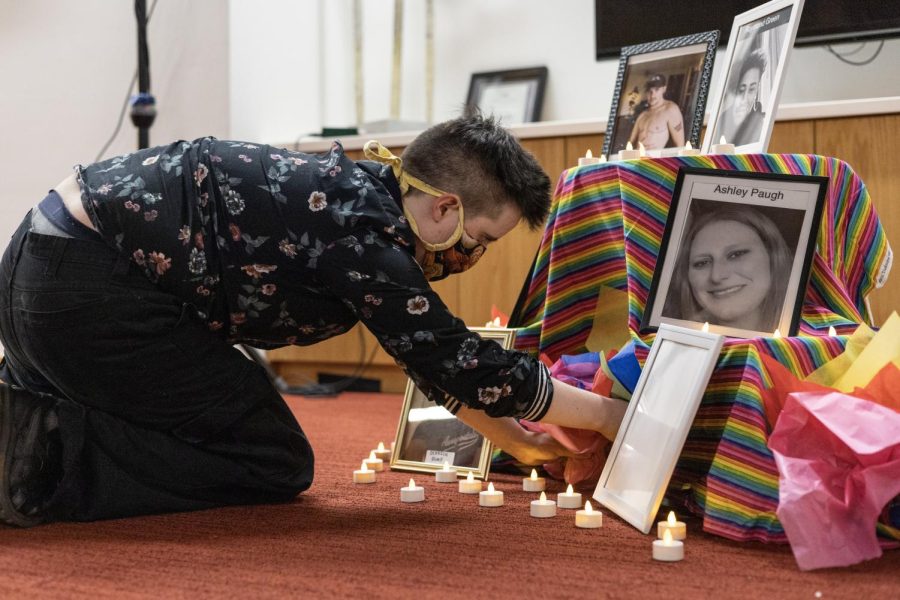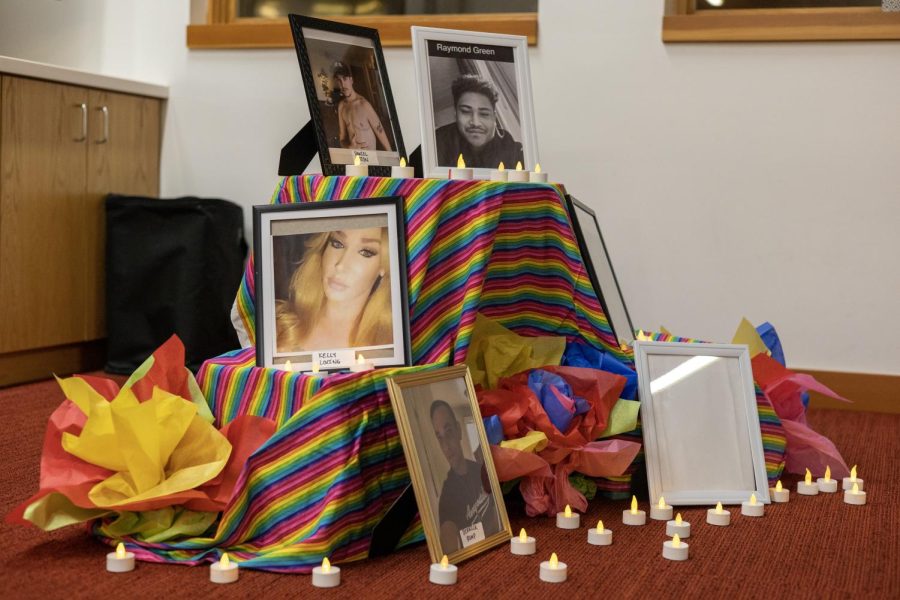Club Q victims are memorialized by OSU’s queer community
Master’s student in gender studies, G Koffink (any/all) helps to set up the memorial table on Nov. 21 in the SEC for those lost in the recent Colorado Springs shooting. The shooting occurred in Colorado Springs on Nov. 19-20, with five people being killed and 17 more injured.
November 22, 2022
In light of the shootings at Club Q in Colorado Springs last Saturday, Queers Studies, the Hattie Redmond Women and Gender Center and the Pride Center held a vigil in honor of the victims.
Gathered in the lobby of Oregon State University’s Student Experience Center, attendees mourned the loss of the five people who died in the shooting. Raymond Green Vance (he/him), 22; Kelly Loving (she/her), 40; Daniel Aston (he/him), 28; Derrick Rump (he/him), 38; and Ashley Paugh (she/her), 35; were all given spots on the altar, while a blank picture frame stood in to represent those injured in the attack.
Members of OSU’s queer community came forward to speak at the vigil, including Associated Professor of Women, Gender and Sexuality Studies Dr. Qwo-Li Driskill. Driskill, who grew up in rural Colorado, expressed in their remarks that tragedies like this are all too common for the queer community.
“Many of us who are LGBTQIA+ are very aware of the experiences of violence that happen towards us and our communities,” Driskill said. “And unfortunately, I think it is our responsibility to know how to hold grief when we experience it. A lot of us are quite experienced with it.”
Finn Johnson, a transgender student pursuing a PHD in WGSS, grieved that two of his “trans kin” had been taken from the community during Transgender Awareness Week. According to him, this attack adds to the pile of struggles transgender people in America currently face.
“Right now there are 155 anti-trans bills being introduced in the United States legislature,” Johnson said. “Trans people are dying in unprecedented numbers. Police and state violence have reached a critical level. Trans folks are being denied the right to medical care, safe shelter, to play sports, to be out at school, to have healthcare paid for by the state, to have correct identification, the use of public restrooms, to hold professional licenses, to obtain a public education without discrimination. To live. To live. To live.”
According to the American Civil Liberties Union, as of Nov. 4 there are 55 active, signed or still bills in process that can or could affect trans individuals at the state and federal level. The exact number of anti-trans bills across the nation is unclear, due to the range of issues.
Though it is a difficult time for the LGBTQ+ community, the speakers emphasized staying persistent during such tragedies. Cindy Konrad, director of OSU’s Pride Center, expressed the importance of events like the vigil and queer spaces in general.
“Our community spaces are sacred, and when we come together like this, we help each other cook or do homework or do those little things,” Konrad said. “These spaces are sacred. Our bodies are sacred.”
Dharma Mirza, a graduate student pursuing a master of arts in interdisciplinary studies in WGSS and ethnic studies, spoke about remaining spirited through difficult times.
“I think as queer and trans folks we’re taught to be afraid, we’re taught to take all the magic out of our experiences,” Mirza said. “I think that offering ceremonies is just one way that we can reinfuse the magic into our lives even when we’re grieving.”
All of the speakers read poetry during the vigil, addressing both the ideas of grief and persistence expressed throughout.
Driskill read Audre Lorde’s “A Litany for Survival.” Mirza read “After the Orlando Shooting” by Juniper Cruz from Cruz’s larger collection, and “Halal If You Hear Me,” by Fatima’s Asghar and Safia Elhillo; and Beyza Ozer’s “I’ve Watched Myself Die Twice This Week.” Konrad recited Danez Smith’s “Principles,” and Johnson read from Joshua Jennifer Espinoza’s “There Should Be Flowers.”
Driskill concluded the vigil with the singing of Holly Near’s “We Are a Gentle, Angry People,” a protest originally written in response to Harvey Milk’s assassination.
For those who wish to help out the families who lost loved ones in the Club Q shooting, the following article by The Denver Post provides links to various funds: https://www.denverpost.com/2022/11/20/how-to-help-club-q-shooting-victims-donate/











































































































